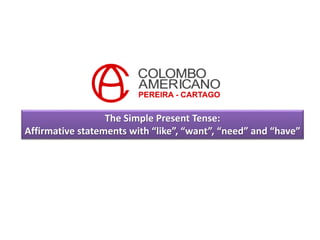
C2 U6 Project simple present. like, need, want and have.
- 1. The Simple Present Tense: Affirmative statements with “like”, “want”, “need” and “have”
- 2. The Simple Present Tense: Affirmative statements with “like”, “want”, “need” and “have” The Simple Present Tense: • Express routines. • Express habits. • Express hobbies, daily events. • An idea or action that happens now.
- 3. The Simple Present Tense: Affirmative statements with “like”, “want”, “need” and “have” The Simple Present Tense: • Express routines. • Express habits. • Express hobbies, daily events. • An idea or action that happens now. LIKE They like the toy.
- 4. The Simple Present Tense: Affirmative statements with “like”, “want”, “need” and “have” The Simple Present Tense: • Express routines. • Express habits. • Express hobbies, daily events. • An idea or action that happens now. LIKE NEED They like the toy. They need to buy food.
- 5. The Simple Present Tense: Affirmative statements with “like”, “want”, “need” and “have” The Simple Present Tense: • Express routines. • Express habits. • Express hobbies, daily events. • An idea or action that happens now. LIKE NEED WANT They like the toy. They need to buy food. They want a house.
- 6. The Simple Present Tense: Affirmative statements with “like”, “want”, “need” and “have” The Simple Present Tense: • Express routines. • Express habits. • Express hobbies, daily events. • An idea or action that happens now. LIKE NEED WANT HAVE They like the toy. They need to buy food. They want a house. They have a car.
- 7. The Simple Present Tense: Affirmative statements with “like”, “want”, “need” and “have” Look closely…
- 8. The Simple Present Tense: Affirmative statements with “like”, “want”, “need” and “have” LIKE They like the toy.
- 9. The Simple Present Tense: Affirmative statements with “like”, “want”, “need” and “have” LIKE They like the toy. HE likes the toy.
- 10. The Simple Present Tense: Affirmative statements with “like”, “want”, “need” and “have” LIKE They like the toy. HE likes the toy. SHE likes the toy.
- 11. The Simple Present Tense: Affirmative statements with “like”, “want”, “need” and “have” NEED They need to buy food.
- 12. The Simple Present Tense: Affirmative statements with “like”, “want”, “need” and “have” NEED They need to buy food. SHE needs to buy food.
- 13. The Simple Present Tense: Affirmative statements with “like”, “want”, “need” and “have” NEED They need to buy food. HE needs to buy food. SHE needs to buy food.
- 14. The Simple Present Tense: Affirmative statements with “like”, “want”, “need” and “have” WANT They want a house.
- 15. The Simple Present Tense: Affirmative statements with “like”, “want”, “need” and “have” WANT They want a house.
- 16. The Simple Present Tense: Affirmative statements with “like”, “want”, “need” and “have” WANT They want a house. HE wants a house
- 17. The Simple Present Tense: Affirmative statements with “like”, “want”, “need” and “have” WANT They want a house. SHE wants a house HE wants a house
- 18. The Simple Present Tense: Affirmative statements with “like”, “want”, “need” and “have” HAVE They have a car.
- 19. The Simple Present Tense: Affirmative statements with “like”, “want”, “need” and “have” HAVE They have a car. HE HAS a car
- 20. The Simple Present Tense: Affirmative statements with “like”, “want”, “need” and “have” HAVE They have a car. HE HAS a car SHE HAS a car
- 21. The Simple Present Tense: Affirmative statements with “like”, “want”, “need” and “have”
- 22. The Simple Present Tense: Affirmative statements with “like”, “want”, “need” and “have” HAVE and HAS
- 23. The Simple Present Tense: Affirmative statements with “like”, “want”, “need” and “have”
- 24. The Simple Present Tense: Affirmative statements with “like”, “want”, “need” and “have”
- 25. The Simple Present Tense: Affirmative statements with “like”, “want”, “need” and “have” Homer and Lisa have a computer.
- 26. The Simple Present Tense: Affirmative statements with “like”, “want”, “need” and “have” Homer and Lisa have a computer. (they)
- 27. The Simple Present Tense: Affirmative statements with “like”, “want”, “need” and “have” Homer and Lisa have a computer. (they) Homer has a computer.
- 28. The Simple Present Tense: Affirmative statements with “like”, “want”, “need” and “have” Homer and Lisa have a computer. (they) Homer has a computer.(he)
- 29. The Simple Present Tense: Affirmative statements with “like”, “want”, “need” and “have” Homer and Lisa have a computer. (they) Homer has a computer. Lisa has a computer. (he)
- 30. The Simple Present Tense: Affirmative statements with “like”, “want”, “need” and “have” Homer and Lisa have a computer. (they) Homer has a computer. Lisa has a computer. (he) (she)
- 31. Thank you!!!